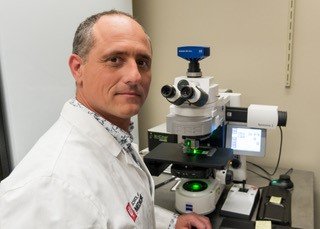Dr. Konstantin Feinberg from Indiana University Awarded $90,000 Knights Templar Eye Foundation Grant for Neurotrophic Keratopathy Research
Dr. Konstantin Feinberg from the Indiana University School of Medicine was awarded a $90,000 grant for his research entitled: Defining the mechanism of NGF activity in cornea: development of new topical therapeutics to Neurotrophic Keratopathy.
Clarity of the cornea is critical for vision. The corneal epithelium is the outermost layer of the cornea, separating the cornea from the external environment. Unique transparent epithelial cells form the corneal epithelium. They originate from the epithelial stem cells and migrate from the corneal periphery towards the center to replace the sloughing older epithelial cells or replenish wound areas after cornea injury.
The cornea is protected by sensory nerves that activate tearing and blink reflexes. These nerves may play a critical role in regulating the epithelial renewal, but the mechanisms are unknown.
Lack of corneal sensory innervation causes Neurotrophic Keratopathy (NK) in 5/10,000 people worldwide. Because of recurring injury and failure to heal, NK eventually leads to irreversible blindness. In children, congenital NK is often caused by developmental abnormalities in the nervous system. Corneal nerve-associated secretion of nerve growth factor (NGF) may regulate corneal epithelial renewal via unknown mechanisms. Human NGF (cenegermin) is the only FDA-approved drug for NK. Although the treatment improves some NK symptoms, it is not efficacious in 30% of patients, incurs high costs (>$80,000), and requires dosing every two hours, six times a day, for months.
Dr. Feinberg aims to define the mechanism of cenegermin’s activity in inducing epithelial renewal and improve its efficacy, thereby, improving treatment for children with NK.

